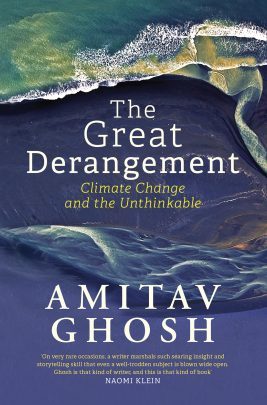Books: Amitav Ghosh’s The Great Derangement
 Sea facing house? Crazy Idea.
Sea facing house? Crazy Idea.
If you wrote a series of books, were aware of writing them, and yet you never acknowledged that you had written them, and, indeed, went on to say that the books did not even exist, the denial would strike most people as deranged.
A similar situation prevails regarding climate change. We made this happen. We know why it is happening. We know who the contributors to climate change were in the past, and who will be the contributors in the future. The science is undeniable, the evidence compelling. the predictions dire. But we refuse to act, or act too slowly, and more often than not, simply deny that climate change is caused by us or that it is anything to bother about. Such reactions, given the facts, are deranged.
Amitav Ghosh’s The Great Derangement is about this deranged mentality about climate change. It starts with a personal anecdote about how Ghosh was witness to a tornado in Delhi in 1978 and ends with an outstanding analysis of the language of two documents on climate change: the Paris Agreement and the Pope’s encyclical, Laudato Si’. Ghosh’s book is not merely a recounting of the evidence available and the predictions made. That much the book does with staggering research to back it. The book makes you aware that our surroundings have come alive in a way that is uncanny. Our reactions to climate change – ponderous, backward, bureaucratic and unwilling – are a result of the historical replacement of an awareness that nature can be difficult to handle with a confidence that our lives, with their daily routine, will continue forever. So confident are we that the richest of us build their mansions closest to the sea.
We will, it would appear, for all time to come, read newspapers in the morning, with our favorite cup of tea, and then leave for our work in our cars, work through the day in air conditioned environments, and return to an evening full of political debates on TV, rounded off with a movie at night. This belief is not just ingrained in us: it is ingrained in the most sensitive or artists. Any artist who even mentions climate change is immediately sent off to the realms of science fiction. Catastrophe cannot be spoken off. If you do, you are either a religious maniac or a science fiction dabbler. Such habits are curiosities, to be handled by keeping them to the margins. Such is the power of this idea – and such is the power of capitalism and empire – that the Paris Agreement barely breathes the word catastrophe anywhere.
Our humdrum existence, with its TVs, cars, and ACs, does have a dangerous corollary. Not only can this model not be repeated for every single human being on this planet – Ghosh notes that we would be asphyxiated to death if it were – but we need to re-think the way we live if we have to survive the disaster that is knocking on our doors. And modernity does not allow us to rethink. In a sense, modernity refuses to look at the sciences that it so assiduously nurtured.
The disaster would not have been knocking on our doors. We would already be facing its full force, had it not been for the backwardness enforced on its colonies by imperial powers like England. In a sense, colonialism held back the full impact of climate change. Now, as we see India and China economically march ahead to copy the ordinary lives of the westerner, we have suddenly come up against the ghoul of climate change.
The copying can no more be done without paying a cost that one shudders to think of: vast populations in poorer countries are at great risk of water scarcity, freakish weather events, food scarcity and the ensuing collapse of the social order. In the book, Ghosh records with chilling accuracy the vast amounts being spent by the US Military on research on climate change precisely because they know that it will bring forth destabilization on a vast scale.
The tides of the richer countries will be refugee-dimmed. The military is aware of the crisis and its potential costs. To keep the power imbalance between the North and the South the same, the US Military is gathering its intelligence quietly and preparing for the oncoming events. Meanwhile, the political class refuses to acknowledge climate change. And that is what we get to hear and read. But the bureaucracy and the military are doing their work, knowing that privilege and power have to be maintained, whatever the costs.
Ghosh’s analysis of the language of the Paris Agreement and the Pope’s encyclical Laudato Si’ is worth its weight in gold. The Pope’s encyclical is clear-eyed, written in simple language, and does not beat about the bush. It calls a spade a spade. It speaks of impact of climate change on the poor, the dreadful impact of the economic doctrine of free trade, the rashness of the current worship of the financial world, the stranglehold of business on politics. The Paris Agreement is written in a highly bureaucratized language – Ghosh says that it has just two sentences, with a vast number of colons, commas and semi-colons partitioning each sentence. Needless to say, the meanings of the sentences are lost in legal interpretations. What is surprising is that while the Pope’s document does not rely on any miraculous interventions, the Paris Agreement essentially depends on the miraculous intervention of technology, which is yet to appear. The Paris Agreement is an expression of the stranglehold of business on politics, and not a lamentation of it. This is merely a snippet of Ghosh’s analysis, which is one of the most striking aspects of the book.
Much else can be said of the book. But this must be said. Books on climate change tend to be read to be forgotten. We move on with our lives, precisely those lives that are most damaging to the environment. We read Kolbert’s Field Notes from a Catastrophe and move on. These books are not just books. They stand as an appeal. An appeal to look around us and ponder on what to do next if we want to survive. If one lives to read books, then one should read Ghosh’s book to know that we won’t be living to read books for long.
Publishers: Allen Lane, Penguin Books




